Asya Patrysheva: “The Internet is no longer just a network. That's life"
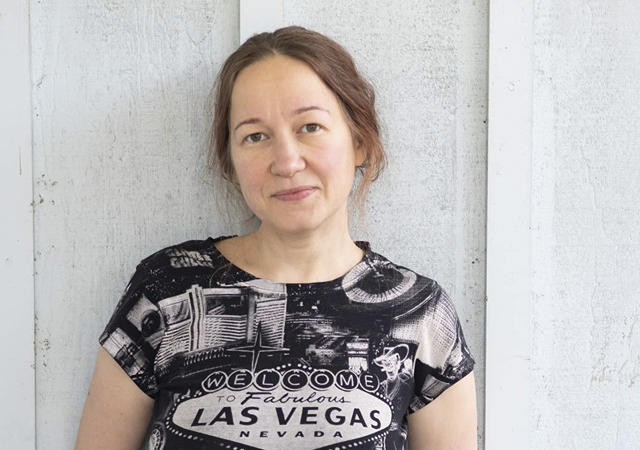
Asya Patrysheva is the first girl in St. Petersburg to receive the Fido node address, the first owner of the private domain kenga.ru in the history of the Russian Internet. Asya worked as a designer at Nevalink, a webmaster at Cityline, Artemy Lebedev's studio and Intel, then founded Travel.ru, a travel and travel information source in Russia. Now she is helping DataArt develop a self-test platform for Skillotron IT professionals, and in an interview she spoke about the romantic period in the history of the Internet, the first providers and the FidoNet community.
- Your first contact with programming, computers, networks, how did it happen?
- My parents are programmers, they graduated from the 45th boarding school, matmash. So from childhood it was: “You are 6 years old, you still don’t know BASIC how it can be done!” I didn’t learn BASIC at 6 years old, but I learned to play Tetris when it appeared, Klingons and so on. When there were still digitizers before mice, cars - SM-2M, M-6000, all kinds of punched tapes ... So I was not supposed to have any other fate. In the 45th I didn’t enter my chagrin, I didn’t take me in the 239th, because I was unsuccessful in behavior, and they probably wanted peaceful girls. And I went to thirty - there, too, was not bad. Then the mother-in-law, whom I left, intending to go to the medical. But it did not work out because Fido appeared, and it distracted me greatly.
At 38 seconds, Tom Jennings, the creator of Fido, explains how the network worked in the BBS The Documentary documentary
“How did you hear about him?”
“A friend of my parents told my father.” My father was involved in programming protocols for modems, so we formed a modem. In 1991, we connected to Fido. What attracted me was not even the fact that there were some online games, files, or something else. There were living people. For them, I was an even more exotic animal. I was 16-17, a girl with a modem, and there were crowds of geeks. For a long time they could not believe that I was a living person, not a fake. I even had to publish a photo of my passport. After that I received, as they would say now, “a million subscribers”, as well as Fido’s node address - 2: 5030/19. This was the first girl node in St. Petersburg.
As soon as my number appeared in the node list, everything turned around right away. I went to celebrate the New Year in Moscow, there are a lot of acquaintances. Girlfriends began to form - programmers sooner or later got married after all. There was such a big party. First met in Moscow at Komtek - this was just the main meeting point for all fidoshnikov. Met also abroad. I remember going to sysopka to Estonia (a hangout of system operators - approx.), And Finnish fidoshniks arrived there. One of them, the coordinator, is Elton John's stepbrother.
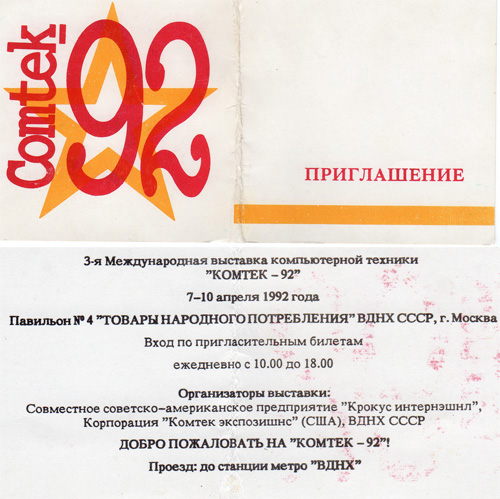
Comtek - the main Russian exhibition of high technologies of the 1990s
Then I met other European fidoshniki. I went to France - they invited me to visit. She traveled for two or three months - Luxembourg, Switzerland, Belgium - all with fidos. The coolest thing was in the French monastery of Taizé in Burgundy. There, one of the brothers was responsible for computer communications - Brother Roy. He even let me go to the computer so that I would write a letter home that everything was OK. A sea of dating brought me Fido. We traveled a lot both in Russia and Ukraine - there was a big party in Dnepropetrovsk, Kiev. Now almost everyone has moved to the States.
- How did communication in Fido happen technically?
- The modem connected to the computer , which we still had with the most beautiful Hercules screen - orange-black, awesomely beautiful, Norton Commander and all that. The fidosh network had its own special programs: that is, you are calling on a telephone line, it is: pee-pee. It was also necessary to enable tone dialing at the telephone exchange, because not all modems worked with pulse. Modems were at a very low speed - 2400, 1200 at first. Moreover, 2400 had to be certified. It cost 300-400 dollars, I went to Moscow for him. There were modems right up to 9600 and 14400 - usually from large companies.
When the modems dialed, they whistled for each other - they installed the handshake. Special programs took away mail packages, that is, it's not that you connected, you hang and do something there. You received a mail package, unpacked it, and ended up with a bunch of letters - netmail and echoconferences. Around the beginning of the 90s, I started to echo (now it would be called a group) about ru.travel travels, in which I began to put together everything that I came across. Such information was categorically lacking. Russian-language guides just appeared, English-speaking was also not enough.
There were others, of course, echoes. Gradually, I became interested in the organization of the community, how these crowds work, moderation and everything.
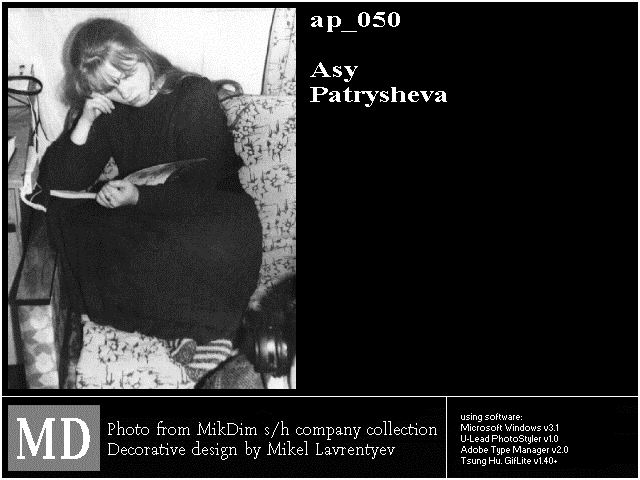
Asya Patrysheva reads a tutorial on C ++
With the Internet, such as we know it now, in the form of browsers, and not in the form of FTP and other manually arranged connections, I met in the year 1993, somewhere in Moscow. Then for a long time she lived in Demos. There were IRC chats - we chatted at night, then we found out that everyone was close to each other. Providers went to visit each other, system administrators ...
I just went to visit Moscow - I haven’t lived there yet. And there was already the 96th year when I got a job with the Internet, made a website. There, my boss was Dema Kudryavtsev. We made the design of the St. Petersburg provider, received some kind of reckless reward. At the same time, the owner brought us a Talmud and said that he wanted to make the site as beautiful. That there was a spine of the book, so that everything is in the old style. I still worked at Nevalka, then my husband was persuaded to move to Cityline, and we moved to Moscow. I also worked at Cityline, in Lebedev's studio almost simultaneously. Then I was a webmaster at Intel, and from Intel I already left to do Travel.
- Tell us how you got the domain kenga.ru.
- When domains began to appear in the zone ru, they were issued for a reason. An administrative group was assembled, about 10-15 people, and by voting decided whether to give the domain or not. I applied for kenga.ru and got a private domain. Then there was the Subject with my tema.ru and all-all-all began to register different domains. In particular, we had travel.ru, mail.ru and a bunch of other things.
- Why Kanga?
- Because it was developing into a "kangaroo", almost a kangaroo. For a long time I went over different names, I liked it, and there was my personal site. Then I sold the domain and moved to kanga.ro in Romania - it's even funnier. But it turned out that it was easier to die than to have a personal address in the ro zone. Because no one will automatically write ro, no matter how you dictate, and if you suddenly write, when rewriting, fix it on ru.
- How was the domain registration? Did you have to write some kind of application?
“Yes, but I don’t really remember the details, because my husband was involved in all this.” It was still in Nevalka before the word Runet appeared. Somehow it was all done quite quickly and cost quite penny money. Then, domain registrars began to appear with notarized power of attorney to transfer back and forth. Further it was much more difficult.
At first, no one even imagined the values of these domains. Sat: “Oh! business.ru. Ha, free! ”Registered. «Travel.ru? Free! ”They registered, and then they began to think what, in fact, to do with this happiness.
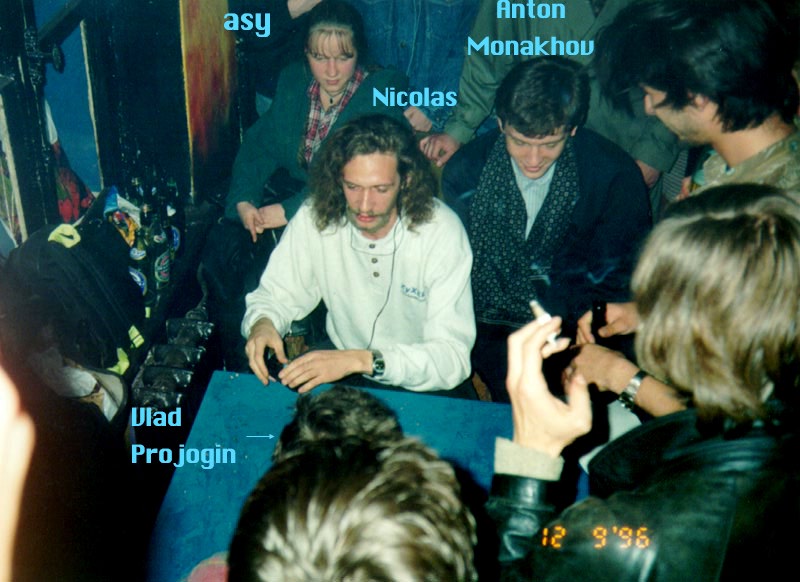
Fidoshovaya party in the club Fish Fabrique September 12, 1996
Mass domain registration, when everyone ran fast, fast, this is the end of 1996, 1997. We just moved to Moscow. I remember the first time we went to work at Cityline, searched for where he is. Then Lebedev's studio was sitting in some kind of basement, literally 3-4 people worked in it. That is, the Internet was still very small. Steam Locomotive News has just appeared; all of these blogs are personal. The movement has formed. The people came to St. Petersburg, led by Nosik, then a large crowd went for a walk to Moscow.
"Nevalk" then - the main stronghold of Runet in St. Petersburg, on it all these blogs were - Zhitinsky, someone else. They had a site www.spb.ru and the newspaper St. Petersburg Times English. Then other newspapers began to come in, which wanted to be posted on the Internet too. Dvizhuha began with some daily news. In Moscow, Cityline did this. The theme was design, Dema came up with all this content.
- What were your job responsibilities?
- I was a webmaster, web designer. I spread the sites, made them, drew. It was necessary to follow everything, write news.
- By what means?
- Manually, naked HTML, upload it later via FTP. She used HomeSite as an editor. That is, there were a bunch of files, a bunch of directories. It was necessary to check if the links are live, if there are broken links. There were special software validators that checked whether all links lead to the right place, whether all files are loaded. I had to pay a lot of attention to file size. For example, an animated gif of 200 kilobytes is "Why are you crazy, they will wait a month for the page to load, you can’t do this."
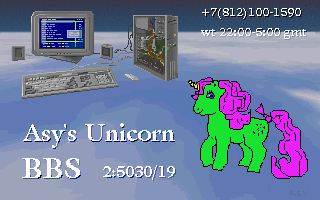
Bbs with Asi Patrasheva
The backgrounds of the pages are even stranger. All this fashion layout. At first there was one, then Theme came up with another. Then they wrote a publishing system in the studio when you do something, and it quickly generates a website from templates, but it is also static, not dynamic. Then programs with dynamic websites began to appear, loading from the database, protecting all this, because what is not static can be broken. Next - flashing inscriptions running back and forth. The banners are small-small, the banner-exchange system that Theme created - in my opinion, it was called “Reklama.ru”. There were real battles for who to let into this banner exchange network, who not to let. Banner sales. Then they still cost more than $ 10 per thousand - now this price generally seems incredible. And the clickability of the banners was high - 3-4-5 percent. There was little advertising, but it was beautiful and reacted to it.
- There is a feeling that we have lost some great part of the Internet?
- Lost content sites without ads. Maybe now there are such fans, but they simply can not be found in the array of information. And in the 1990s, content appeared because someone had the pearl to do it. The word "monetization" was not there yet. Kulichiks appeared, these overseas, on which there were a lot of sites, the parties began to form American, Israeli - Russian-speaking enclaves. Something turned into the media, something into sites of interest.
It's funny that those who make the Internet were considered providers - those who laid it physically: fiber, computers, servers. They were considered the main ones, they had their own party, and they looked very askance at everyone else: “Runet - what is this? On what we have built, they are doing something. ” And then again - all these techies are gone. Who remembers them? Content came to the fore and became much more important. Then Yandex was still small, and Rambler was a powerful search engine.
- Anyone who made the first content, one way or another, were tied to providers?
- Undoubtedly. Firstly, because you had to upload sites somewhere. Either you have your own server, or friends. Because just going to buy a server place was difficult. Such services were provided abroad, but this is slow access, slow channels. Again the domain of the nth level. And here you come, negotiate with someone, register a domain, upload. Or the provider supports you, gives you a place, and you do something, and instead place, for example, the provider’s advertisement.
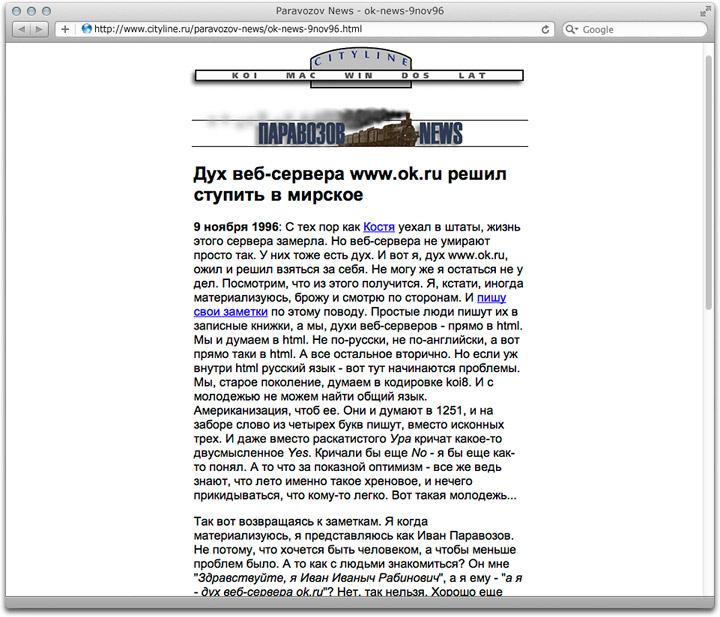
“Paravozov-News” - notes “about everything and about nothing” by the ok.ru server of Ivan Paravozov (Alexander Gagin) - began to appear on November 6, 1996. Already at the end of 1996, the column went to the server of the newly created Moscow provider Cityline "And served him as an advertisement.
- When it became clear that there could be business behind all this?
- I think it has begun with Cityline. When Steam Locomotive News appeared, and then Dema came up with subscription news. That is, he hired translators and editors, they took news from foreign news feeds, translated them quickly into Russian, a half day or a day later posted them in open access, and those who wanted were quickly sent for money. In fact, this was the first monetization, because exchanges of banners and their sales did not bring a lot of money. Then Intel actively used the Internet as a channel for promoting itself. They sponsored some projects, made a runet map, held competitions. I think other companies were involved in this, just Intel was the most prominent player in this market in Moscow. Because Anton Nikitin worked there, closely connected with the whole party. He, too, was Anton Borisovich, like Nosik, and sometimes replaced Nosik in the notes of “Evening Internet”.
Then all sorts of "Ribbons" began to appear, and so on. Price.ru had a business model - they placed advertising lines in the database for money and made money on it. In Travel.ru such a model was also originally. Here is the base of tours, the base of agency proposals, and around all this is the content that I have been compiling since the time of Fido. A huge base is what later became a regional reference book, which we, of course, have rewritten many times since then. If you simply put up the base of tours, it looks like a newspaper ad. Something unique was needed, which would make us different. To make quality content, we invited professional editors, proofreaders. Gradually, news, a forum and all that went.
- Who wrote for Travel.ru?
- Absolutely different traveling people. Among the editors was Sasha Lapshin, who was arrested in Belarus a couple of years ago and extradited to Azerbaijan for traveling to Nagorno-Karabakh. He spent a year in prison, he was rescued with difficulty, and now he is suing both Belarus and Azerbaijan - a big international scandal. Ankhar Kochneva also wrote to us. Then the militants abducted her, for about 7 months she was captured in Syria.
Our stories were not only about exceptionally wild tourism, like the Vinsky forum, but also about tourists who travel with agencies - sometimes it’s even more profitable. The main thing is that we collected information and cataloged it as much as possible. They wrote their own complex publishing system with cross-references - what is now called tags, tags.
- Was it expensive to launch Travel.ru?
- Mail.ru was almost halfway there. At one time, we sold them a domain for $ 500, then we agreed on a partnership: Mail.ru and DataArt helped with a programmer, financial consultant, office and a small amount of cash. And these are the only cash injections in Travel.ru, which were for all the time. It is clear that I lived for a long time without a salary. She left Intel in May-June, and in August the first employee at Travel appeared, except for me, who was engaged in sales and worked there for all 15 years. We started to receive the first advertising money in two or three months.
First, advertising was given by travel agencies. Then they were joined by airlines, insurers, hotels, sellers of related products - suitcases, for example. Gradually, sponsored content began to appear: trips abroad, when then you write a report.
We were considered conditionally a Moscow website, and sometimes it helped out that I said: "I am from St. Petersburg, not from Moscow." So we got customers from St. Petersburg. Once a representative of a St. Petersburg travel agency came: "Here is our banner." I looked, and he is black and white, very sad. I say: “You, comrade, are selling the holiday, impressions, and the banner is black and white. Let me draw you a beautiful color for free. " Drawn. He: "Well, put it, but ours too." We put both banners in rotation to see which one will be clicked on. As the Moscow audience prevailed, more color was pressed. But when I climbed out to look at the geographical distribution, it turned out that a little gray was clicked in St. Petersburg. The travel agency knew everything about its people, who, after a gray banner, would want a blue sea. This is the question of monetization and adjustment to the audience. In fact, manually, such ridiculous methods.
In general, everything was somehow minimal. At first, there wasn’t enough tracking of final sales, end-to-end points: what did a person do on the site after clicking on the banner. There were either simple shows or some articles - native advertising, jeans, that’s all. It worked quite neatly. People came and said, write how cool it is with us. If you really were there, if it’s really cool, then why not? And the money is because you are additionally advertising this article. It turns out absolutely honestly both before the audience and before the advertiser.
Then there were no complicated schemes, virtual money, direct monetization. Nobody paid a percentage of the tour - they paid a fixed amount for showing ads. On Price.ru it was exactly the same. Want to be highlighted in bold, you pay more - like in newspapers. The first page that blocks all of the content is even bigger. A small line at the bottom, a button - a smaller one. Or generally free if the interchange buttons.
All this life was in full swing in the 2000s, when the Internet became active. And before that, we were sitting in the office of Mail.ru, which already had the first million users, among which they were just playing their first car. Port.ru was launched - it was called the "vertically integrated horizontal portal." Then Keith Korzun came up with a complex scheme with services and themes. I drew a matrix where services are mail, forums, announcements, and topics are cars, baby products, news ... A huge office was at first, then it decreased. Investors came, and most importantly, all companies have evolved this way. “Rambler” at first it was just a group of programmers with Dima Kryukov, who were doing something there. Then they took off on a search engine, came up with a site counter, some content began to appear around, because the counter was used as a directory.
Alternative advertising systems appeared, the “Runner” is the same. At one time we sat wall to wall with Basov and Andreev. Travel.ru is the first one on which this "Runner" was launched and tested. We participated in the development with pleasure, then this contextual advertisement appeared at Yandex. It was also terribly interesting how it all works.
I had an idea then that no one benefits from competition, and we wrote on Travel.ru: “If you haven’t found anything, look at the tours on another similar site.” Gave links to our conditional competitors. Because the main task of the Internet, from my point of view, is for the user to find what he needs. I also think that information should be free, so I disapprove of all these payvls. That is, I understand that the production of high-quality content needs to be paid for somehow, and if possible, not due to the fact that you have the entire screen blocked by advertising and everything else, but not so much that you will receive information only if you pay for it.I am a supporter that it should be free.
- Is it worth arguing that the Internet used to be a romantic environment in which you can talk about everything?
- This can be compared with the development of Fido. At first it was a warm tube, everyone knew each other, all friends. Then thousands and thousands ran up, but Fido is still alive. Similarly, with the Internet. It seems at first you know everyone, these parties, the same RIF . Now if you look at the RIF, there is a young generation that is completely different. This is pure business, advertising, PR - as in any field where a lot of people have come.
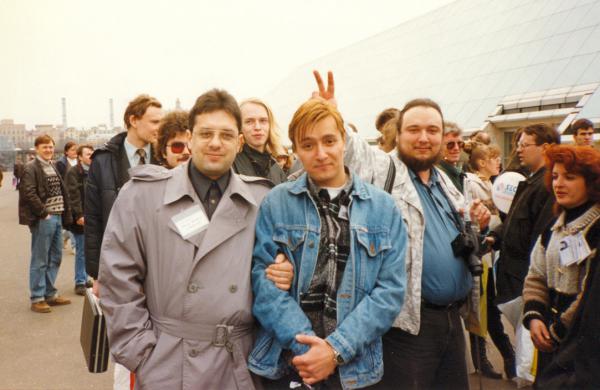
Alexey Exler - an important author of the early Runet - with fidoshnik friends: Oleg Bocharov, Feda Ustinov and Nadia Yatsyk. Comtek, 1997 - Tube Times
What kind of lamp life can there be if there are millions of users in the same LJ and on facebook. They are the same equal participants in the process, content, production. How was it before? There are readers and those who produce content, conditional celestials. They sometimes condescended to meetings, conversations, responded to comments. Now what? Bloggers, bloggers, bloggers ... Everyone writes for his audience, then one of her also starts a blog. There are blogs on how to become a successful blogger. And this is a snake, not devouring its tail, but lengthening it. It turns out an endless process in which all are participants. Even comments have become content, and sometimes much more valuable than the posts themselves.
Is it possible to assume that the crowd in the subway is a warm lamp crowd? Probably, there will be some other place where a small-small party will come first, and then it will lament that everyone has run up again, let's go somewhere else. I looked here - I have had facebook for 10 years. LJ was started in 2000. Wow! During this time, children grow up who start blogging and write something. They already have a completely different set of tools and a different idea of what is appropriate and what is not quite. Recently, one of the friends in the tape told the following story: A child asks his dad where he can find such and such a person. “He had a LiveJournal page,” his father replies. Child: “Tell me more about the museum.”
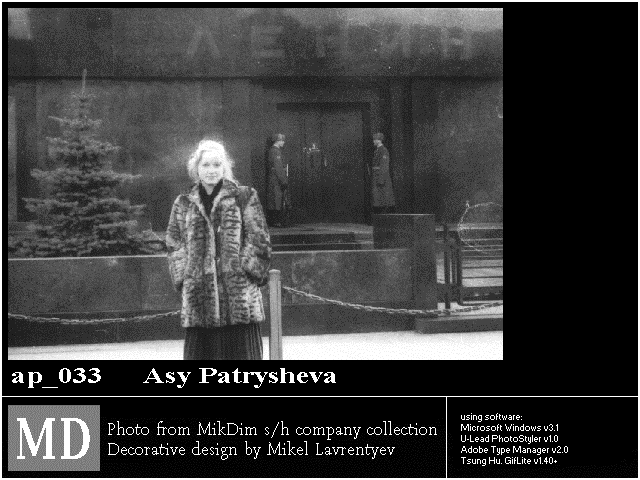
Asya Patrysheva during a walk around Moscow with the Novosibirsk fidoshnik
- It was difficult for other people to explain what the Internet is?
- When I set up networks in schools and taught teachers, funny situations arose. You will call them users, and they: “Ahh, she called us with us!” Or they will ask: “Why write on a computer if you can pick up the phone and make a call?” Now, on the contrary: why make a call, if you can just write in the messenger.
Another dialogue. “Why do you give advice on the Internet?” - “Because I know something” - “Why are you telling this?” - “People ask” - “And what, people can’t search on the Internet?” - “So they just find my articles ”-“ Do you do this in order to receive money? ”-“ No, I get moral satisfaction. ” It is sometimes difficult to explain, sometimes simple. Why am I writing? Because I want information to be available. Because once upon a time I found someone else's useful stories, took advantage of them, and it was convenient. Accordingly, if I can give something in return, why not?
With advertising, it also became clearer and easier, but once people did not distinguish text advertising lines from search results. Now, I suspect, not everything is distinguished either, that's all built on, but it’s already possible to explain retargeting and other things. Previously, it was like this: "Here are the cookies, you went on Travel, and on another site you were caught, knowing about it." Once it was a rather complicated scheme, now it is perceived absolutely naturally.
- Share your impressions of the evolution of networks - from Fido to today.
- Networks have become much more accessible. Previously, the computer was the lot of geeks - mathematicians, physicists, programmers - then the humanities began to penetrate there, and now they have captured everything. It's comfortable.In your friend’s feed, photos appear simultaneously from the South Pole and from somewhere in Africa. From all over the world - at any moment you can understand where what is happening. You can contact your friends. There is no longer a feeling that someone has left somewhere, and you have lost him, communication is ongoing. I come to St. Petersburg and I think that friends are here. It turns out that they left a long time ago, and I communicate with them, not even having time to track the geographical position.
It has actually become much more difficult to meet, but there is skype, instant messenger, video. The fact that everything is nearby, although they are not nearby is a huge achievement. The Internet is no longer just a network. That's life.
- What in the development of networks can be considered obvious breakthroughs?
- Breakthroughs were when daily blogs such as "Evening Internet", "Parovozova" and the like appeared. When they became many, many and they suddenly began to turn into the media. When newspapers and magazines went on the Internet, ceasing to say: “What is your Internet! You have 100 users per hour, and we have a million circulation. ” Then a boom - there are a million views on the Internet, and the newspaper hardly sells 100 copies.
Next up is the emergence of social networks. The emergence of cheap mobile Internet and cheap smartphones, when people switched from desktops to continuous access to content. Now it’s hard to imagine that you find yourself somewhere and you don’t see the transport schedule, your location on the map and where the nearest cafe is located.
- There is a feeling in which direction the wind will blow further? Where is all this going?
- It seems to me that in the future we will remember our time as a period of freedom, when everything was possible. Because Facebook doesn’t already show all the messages, although you want to see them. Locks - this site is closed, and we won’t show it. Large companies began to determine what people should read, and you are not sure that they showed you the truth, not fake.
Previously, networks were like a spyglass. You saw the world through it and you knew that it was glass. Now you don’t know. Everyone has to check the reality of these walls, choose to live walled up in a soap bubble with their friends, or still go out sometimes and find out that there is a different reality, not always the same as on the Internet. How does it come to the village once a week or does it have no electricity? How is there no cellular coverage?
I flew here from the United States, and my roaming dual SIM card did not turn on, and the option with cheap Internet was not connected in the Russian SIM card. While I connect, all the money is consumed. I get a joyful SMS: "You have minus 300 rubles, we are blocking the phone." I think, okay, I’ll connect to Wi-Fi. Figures. In "Sheremetyevo" -2 for this you need to make a call and receive SMS. The phone is locked, I can’t do this. And what happens: I am left without a roaming phone and without my native Moscow. At the transplant, I can’t tell the people who are late or not. There are no public telephones. I’m running, I find a terminal to pay for communications and find that he does not accept 200-ruble bills. God bless her, with a commission of 18 percent - I just can’t connect to the network. It remains in this warm lamp world to hope to be met. Because,if they don’t meet me, I won’t even be able to call a taxi. You stand and think: damn it, you had to have some alternative options. When you fall into the digital future, it comes to the understanding that canned food and cards must still be kept at hand.
All Articles